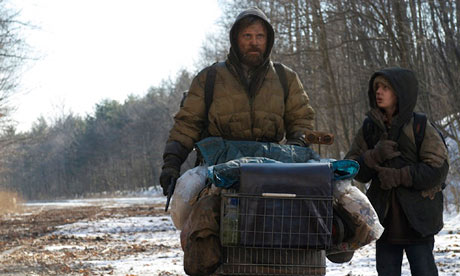
It's a truism that science fiction, however distinct its vision of the future, is always just as much a reflection of its present. The golden age of SF writers, including Isaac Asimov, Robert Heinlein and Arthur C Clarke, predicted near futures of a colonised solar system and an era of engineering marvels from robotics to space elevators. But, viewed through a historical lens, their futures say far more about the cold war politics of 1950s America than the post-industrial world of 2011. If science fiction provides a record of the hopes and fears of each generation for the future ahead, what do contemporary SFwriters say about today?
Seed, by debut novelist Rob Ziegler, extrapolates a future rooted in the economic and environmental concerns of the early 21st century. In common with novels such as Paolo Bacigalupi's The Windup Girl, it explores one of the main preoccupations of science fiction in recent years, the collapse of western-style capitalism. Hardwired into Ziegler's post-apocalyptic vision of a US ravaged by famine and warfare, is an exploration of the extreme material scarcity that the collapse will create for generations to come.
Through a Rust Belt landscape of decaying cities and starving refugees, Ziegler weaves a fast-paced action plot, creating a powerful metaphor for the choices we face today in a world of economic uncertainty. Seed's narrative turns on the mega-corporation city state that controls the future economy, significantly named Satori, the Zen Buddhist term for spiritual enlightenment. Solutions lie, Ziegler's novel suggests, not in the military or political spheres, but in our capacity to address and improve our own nature as humans.
If western capitalism is the victim in much of contemporary science fiction, then China is often the beneficiary. Maureen F McHugh's China Mountain Zhang is surely among the most prescient SF novels of the last century. In McHugh's future, China's command economy dominates the world, and the US has become a secondary power following the Cleansing Winds Campaign, a socialist revolution similar in nature to China's own cultural revolution. At a time when the Occupy movement has taken centre stage in the battle against unbridled capitalism, it's an all too credible scenario (but one McHugh paints in both bright colours and deep shadows; she shows how many of the freedoms and civil liberties now taken for granted in the west might easily be lost in a swing back toward state socialism).
Too often, science fiction views the future from the macro scale, from the standpoints of the movers and shakers shaping its invented worlds. Conversely, McHugh opens China Mountain Zhang with a quote from Albert Camus' The Plague: "A simple way to get to know a town is to see how the people work, how they love and how they die." The novel's protagonist Rafael Zhang faces the dual problems of a mixed-race heritage and being a homosexual in a world where the first defines him as a second-class citizen, and the second merits "re-education" or even execution.
The world McHugh presents through Zhang's quest for individual freedom is all too recognisable today, where human lives are often controlled by the overwhelmingly powerful structures of both government and corporations. But McHugh guides Zhang to freedom from those structures – not through political or military struggle, but the improvement of his own nature as a human being. In his training as an organic or "Daoist" engineer – a discipline which combines computer design technology with the limitless capacity of the human imagination – Zhang finds his own personal Satori, and his own freedom.
Personal freedom, and the discipline required to attain it, are themes science fiction explores in its more positive views of our future. Cory Doctorow's novel Down and Out in the Magic Kingdom is one of the best explorations of a post-scarcity future, in which technology meets all of humanity's material needs. Money has been replaced with the "reputation-based currency" Whuffie, government is conducted through adhocracy, and the world for most humans is one big playground. The challenge in this scenario is how mankind deals with true freedom after a history of oppression and social conditioning.
The irony of a post-scarcity setting is that our civilisation could have achieved it a century or more ago. Once again, the solutions are not technological but rooted in our own nature as human beings. Overcoming or improving our nature may require a moment of society-wide Satori. Whether we are ready for that yet is up for debate.

